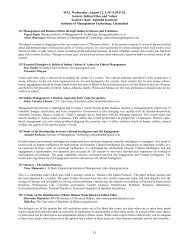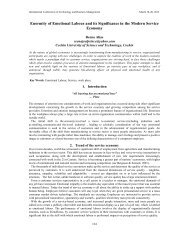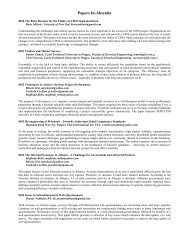Sunday, March 29, 1:30-3:00 PM - Icmis.net
Sunday, March 29, 1:30-3:00 PM - Icmis.net
Sunday, March 29, 1:30-3:00 PM - Icmis.net
- No tags were found...
You also want an ePaper? Increase the reach of your titles
YUMPU automatically turns print PDFs into web optimized ePapers that Google loves.
MC2, Monday, <strong>March</strong> <strong>30</strong>, 1:<strong>30</strong>-3:<strong>00</strong> P.M.Session: E-CommerceSession Chair: Petr FialaUniversity of Economics, Prague217 Supplier Selection by E-auctionsPetr Fiala, University of Economics, Prague, pfiala@vse.czSupplier selection processes have received considerable attention in business. Determining suitable suppliers in supply chain<strong>net</strong>works has become a key strategic issue. Procurement managers choose a portfolio of possible suppliers and negotiate quality,quantity, price, and other parameters. Auction theory has caught tremendous interest from both the economic side as well as theInter<strong>net</strong> industry. The popularity of auctions and the requirements of e-business have led to growing interest in the development ofcomplex trading models. Supplier selection process is formulated by multidimensional auctions. Approaches for modeling andsolving of multidimensional auctions are proposed.2<strong>29</strong> An Investigation into the Adoption of Electronic Commerce in Saudi Arabian SMEsSabah Alsomali, Aston University, alsomals@aston.ac.ukBen Clegg, Aston University, Roya Gholami, Aston UniversityElectronic commerce (e-commerce) has become a driving force for an increasingly interconnected global economy. Developedcountries seem to have comparatively more advanced technological infrastructures for enabling e-commerce adoption.Conversely, developing countries have still to reap the benefits of e-commerce.Moreover, little research attention has beenfocused on the study of e-commerce adoption in developing countries, and particularly in the Arab world as a whole, to assess therelevance of e-commerce in these unique environments. This study aims to explore the status of e-commerce by assessingtechnological, organisational and environmental contexts of Saudi Small and Medium Enterprises (SMEs) to adopt e-commerce.256 E-Entrepreneurship Awareness and OpportunitiesS. Sudalaimuthu Shanmugam, Bharathiar University, sm_vcas@yahoo.comThe purpose of this paper is to assess the e-entrepreneurship awareness and opportunities.The emergence of the Inter<strong>net</strong> anddevelopments in Information and Communication Technologies (ICTs) have opened new opportunities.Methodology - This paperis based on primary data collected through the well structured questionnaire. The study tested few hypotheses with suitable tools.Factor analysis is also used to reduce the variable and find out the most influencing factor in e-entrepreneurship business.Findings: The study reveals the low level of awareness about e-entrepreneurship among the educated but there are plenty ofopportunities available to do ICT based e-business.<strong>30</strong>4 B2B Procurement Practice in Indian Subcontinent: Opportunities & TrendsS. L. Gupta, Birla Institute of Technology, bitresearch@gmail.comHitesh Gupta, Birla Institute of Technology, hitesh_hit2@rediffmail.comBusiness entities today exist in a highly competitive world. They are constantly innovating to meet their business objectives ofproviding essential and unique products as well as services to their customers. So is the case with B2B organisations. RightProduct procurement is the key to every organisation’s success. One ultimately wants senior management to be happy withproducts and services it procures. Therefore vendor insight is vital to any business. Organisations constantly try to grab theopportunity of getting more and more quality vendors as well as retain them in a long run with the help of their relationships.360 Smart Application for Integrating Various Govt. AgenciesAyush Jain, ABV-Indian Institute of Information Technology and Management, ayushiiitm@gmail.comDeepali Singh, ABV-IIITM, deepalipsingh@gmail.comNayan Agarwal, ABV-IIITMWith the advancement in ICT’s government nowadays are getting serious as how to improve delivery of service mechanism to itscitizens. Smart card is now coming up as a tool that various governments can take up to provide services to its valuable citizens.In this research I have tried to raise issues that how smart cards can be used for this purpose. Responses of government providingsmart cards services & citizens using cards are collected through questionnaires & are analyzed. The analysis showed that thereexist many gaps related to technology, policies. The gaps are identified through gap analysis are taken into deep account & I triedto find out the reasons & proposed the framework for it. Smart cards system design followed by a regulatory framework alongwith model of contents of smart cards are the result of the framework proposed.22Intl Conference on Technology and Business Management, Al Ghurair University, UAE<strong>March</strong> <strong>29</strong>-April 1, 2<strong>00</strong>9







